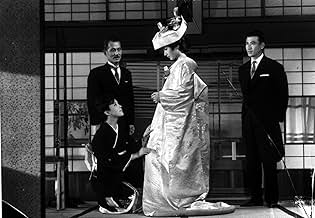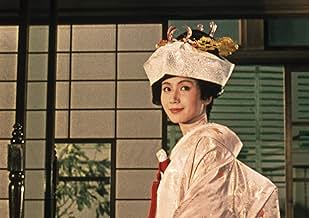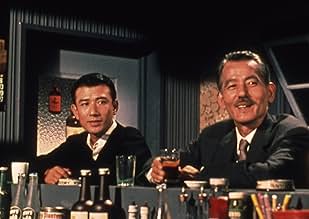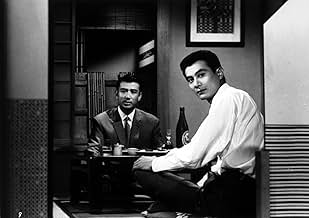Un veuf vieillissant arrange le mariage de sa fille unique.Un veuf vieillissant arrange le mariage de sa fille unique.Un veuf vieillissant arrange le mariage de sa fille unique.
- Réalisation
- Scénario
- Casting principal
- Récompenses
- 4 victoires et 1 nomination au total
Avis à la une
It's also highly reminiscent of many of the mid to late Ozu films in a variety of ways. Like his usual style, the camera is stationary and often is at floor level--with cuts instead of closeups. You may not notice this at first, but it's clearly the director's trademark. In addition, the film has the typical slow and gentle pace and is about the conflicts between modern Japanese life and tradition. In this sense, there's not a lot that's too new about the film other than a light and modern (for 1962) soundtrack--very bouncy yet gentle.
As for the film, the father (Shuhei) has a pretty nice life. He has a nice job, often goes out with friends to drink and Michiko (the daughter) takes care of his needs at home. However, as the film progresses he notices in other people's relationships that something is missing. In particular, meeting with an old school teacher from 40 years ago is a wake-up, as this old man also lives with his unmarried daughter--and his life is a bit pathetic. Shuhei is afraid that in later years, his and his daughter will have a similar relationship. So, he and his married son go about trying to arrange a marriage for Michiko--who does want to marry, though judging by her outward appearance and insistence that she wants to stay home and take care of her father, you's never know it.
Overall, it's an incredibly slow but satisfying film and a nice end to Ozu's career, as it is his last film. Well worth seeing and full of lovely and realistic vignettes. For those who are looking for action and excitement, you may not like this film. For those who can appreciate a slower and more deliberately paced film, this is hard to beat. A lovely portrait of life in Japan circa 1962.
By the way, is it me or did those people in the film really drink a lot?! Wow!
Hirayama frequently meets his old friends Kawai (Nobuo Nakamura) and Professor Horie (Ryûji Kita), who is married with a younger wife, to drink in a bar. When their school teacher Sakuma (Eijiro Tono) comes to a reunion of Hirayama with old school mates, they learn that the old man lives with his daughter that stayed single to take care of him. Michiko lives a happy life with her father and her brother, but Hirayama feels that it is time to let her go and tries to arrange a marriage for her.
"Sanma no aji" is the last movie of the Japanese director Yasujiro Ozu about his favorite theme: family and human relationship. Actually he revisits in color thirteen years later, the theme of the wonderful "Banshun". Both story lines are about an old father that realizes that he can not hold his daughter with him anymore and she needs to get married with an arranged marriage as a natural order of life in the traditional Japan. The beautiful and touching story shows also the contrast between the traditional and the newer generation formed by consumers and is supported by awesome performances and the use of magnificent camera work, with symmetrically framed images. Last but not the least, it is impressive how the characters drink in this movie. My vote is eight.
Title (Brazil):"A Rotina Tem Seu Encanto" ("The Routine Has its Charm")
Le saviez-vous
- AnecdotesYasujirô Ozu: [static camera] There is not a single camera movement in the entire film, as in many of Ozu's films.
- Citations
[English subtitled version]
Yoshitaro Sakamoto: If Japan had won the war, how would things be?
Shuhei Hirayama: I wonder.
Yoshitaro Sakamoto: More whiskey! Bring us the whole bottle. If we'd won, we'd both be in New York now. New York. And not just a pachinko parlor called New York. The real thing!
Shuhei Hirayama: Think so?
Yoshitaro Sakamoto: Absolutely. Because we lost, our kids dance around and shake their rumps to American records. But if we had won, the blue-eyed ones would have chignon hairdos and chew gum while plunking tunes on the shamisen.
Shuhei Hirayama: But I think it's good we lost.
Yoshitaro Sakamoto: You think? Yeah, maybe you're right. The dumb militarists can't bully us anymore.
- Crédits fousThe film title and credits are set against a backdrop of painted fronds.
Generally Yasujirô Ozu films have the credits placed before a backdrop of plain sackcloth.
- ConnexionsFeatured in Yasujirô Ozu, le cinéaste du bonheur (2023)
- Bandes originalesGunkan kôshinkyoku
(Warship March)
Written by Tôkichi Setoguchi
Meilleurs choix
- How long is An Autumn Afternoon?Alimenté par Alexa
Détails
- Date de sortie
- Pays d’origine
- Langue
- Aussi connu sous le nom de
- An Autumn Afternoon
- Lieux de tournage
- Tokyo, Japon(setting of the action)
- Société de production
- Voir plus de crédits d'entreprise sur IMDbPro
Box-office
- Montant brut mondial
- 27 189 $US
Contribuer à cette page



































